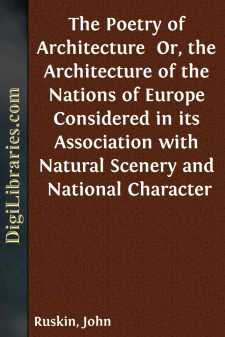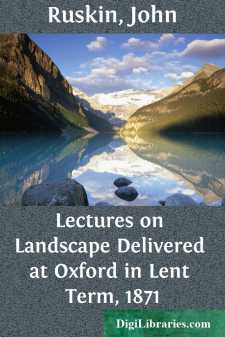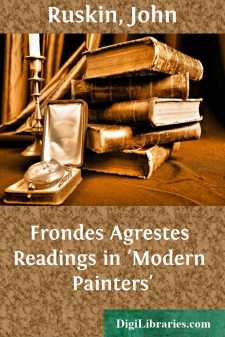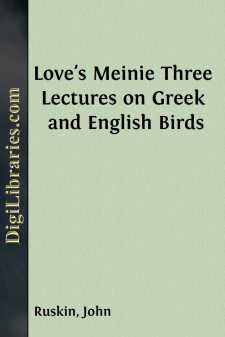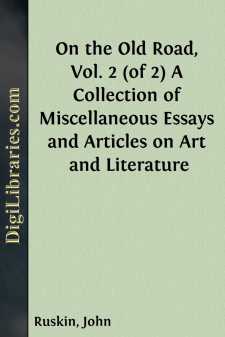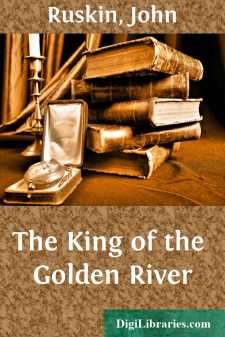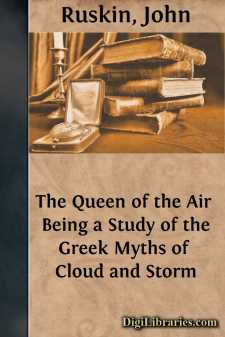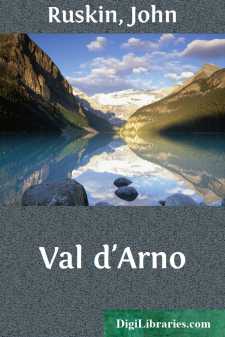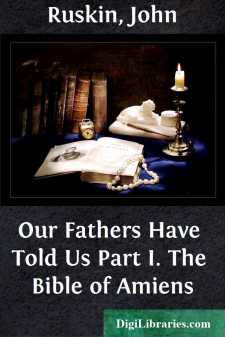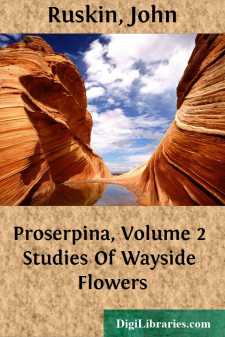Categories
- Antiques & Collectibles 13
- Architecture 36
- Art 48
- Bibles 22
- Biography & Autobiography 813
- Body, Mind & Spirit 142
- Business & Economics 28
- Children's Books 17
- Children's Fiction 14
- Computers 4
- Cooking 94
- Crafts & Hobbies 4
- Drama 346
- Education 46
- Family & Relationships 57
- Fiction 11829
- Games 19
- Gardening 17
- Health & Fitness 34
- History 1377
- House & Home 1
- Humor 147
- Juvenile Fiction 1873
- Juvenile Nonfiction 202
- Language Arts & Disciplines 88
- Law 16
- Literary Collections 686
- Literary Criticism 179
- Mathematics 13
- Medical 41
- Music 40
- Nature 179
- Non-Classifiable 1768
- Performing Arts 7
- Periodicals 1453
- Philosophy 64
- Photography 2
- Poetry 896
- Political Science 203
- Psychology 42
- Reference 154
- Religion 513
- Science 126
- Self-Help 84
- Social Science 81
- Sports & Recreation 34
- Study Aids 3
- Technology & Engineering 59
- Transportation 23
- Travel 463
- True Crime 29
John Ruskin
John Ruskin was a prominent 19th-century English writer, art critic, and social thinker known for his influential works on art, architecture, and society. His notable works include "Modern Painters," where he defended the work of J.M.W. Turner, and "The Stones of Venice," which analyzed Venetian art and architecture. Ruskin's ideas on social justice and the role of art in society had a profound impact on the Victorian era and beyond, inspiring movements such as the Arts and Crafts Movement.
Author's Books:
Sort by:
by:
John Ruskin
INTRODUCTION. 1. The Science of Architecture, followed out to its full extent, is one of the noblest of those which have reference only to the creations of human minds. It is not merely a science of the rule and compass, it does not consist only in the observation of just rule, or of fair proportion: it is, or ought to be, a science of feeling more than of rule, a ministry to the mind, more than to the...
more...
by:
John Ruskin
OUTLINE. 1. In my inaugural lecture, I stated that while holding this professorship I should direct you, in your practical exercises, chiefly to natural history and landscape. And having in the course of the past year laid the foundational elements of art sufficiently before you, I will invite you, now, to enter on real work with me; and accordingly I propose during this and the following term to give...
more...
by:
John Ruskin
SECTION I. PRINCIPLES OF ART. 1. Perfect taste is the faculty of receiving the greatest possible pleasure from those material sources which are attractive to our moral nature in its purity and perfection; but why we receive pleasure from some forms and colours, and not from others, is no more to be asked or answered than why we like sugar and dislike wormwood. 2. The temper by which right taste is...
more...
by:
John Ruskin
PREFACE. Brantwood, 9th June, 1881. Quarter past five, morning. The birds chirping feebly,—mostly chaffinches answering each other, the rest discomposed, I fancy, by the June snow; the lake neither smooth nor rippled, but like a surface of perfectly bright glass, ill cast; the lines of wave few and irregular, like flaws in the planes of a fine crystal. I see this book was begun eight years...
more...
by:
John Ruskin
THE NATIONAL GALLERY SITE COMMISSION. Evidence of John Ruskin, Monday, April 6, 1857. 114. Chairman. Has your attention been turned to the desirableness of uniting sculpture with painting under the same roof?—Yes. What is your opinion on the subject?—I think it almost essential that they should be united, if a National Gallery is to be of service in teaching the course of art. Sculpture of all...
more...
by:
John Ruskin
CHAPTER I In a secluded and mountainous part of Stiria there was in old time a valley of the most surprising and luxuriant fertility. It was surrounded on all sides by steep and rocky mountains rising into peaks which were always covered with snow and from which a number of torrents descended in constant cataracts. One of these fell westward over the face of a crag so high that when the sun had set to...
more...
by:
John Ruskin
I. ATHENA CHALINITIS.*(Athena in the Heavens.) * "Athena the Restrainer." The name is given to her as having helpedBellerophon to bridle Pegasus, the flying cloud. LECTURE ON THE GREEK MYTHS OF STORM, GIVEN (PARTLY) IN UNIVERSITY COLLEGE, LONDON, MARCH 9, 1869. 1. I will not ask your pardon for endeavoring to interest you in the subject of Greek Mythology; but I must ask your permission to...
more...
by:
John Ruskin
LECTURE I. NICHOLAS THE PISAN. 1. On this day, of this month, the 20th of October, six hundred and twenty-three years ago, the merchants and tradesmen of Florence met before the church of Santa Croce; marched through the city to the palace of their Podesta; deposed their Podesta; set over themselves, in his place, a knight belonging to an inferior city; called him "Captain of the People;"...
more...
by:
John Ruskin
PREFACE. The long abandoned purpose, of which the following pages begin some attempt at fulfilment, has been resumed at the request of a young English governess, that I would write some pieces of history which her pupils could gather some good out of;—the fruit of historical documents placed by modern educational systems at her disposal, being to them labour only, and sorrow. What else may be said...
more...
by:
John Ruskin
CHAPTER I. VIOLA. 1. Although I have not been able in the preceding volume to complete, in any wise as I desired, the account of the several parts and actions of plants in general, I will not delay any longer our entrance on the examination of particular kinds, though here and there I must interrupt such special study by recurring to general principles, or points of wider interest. But the scope of...
more...


